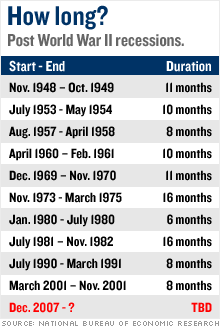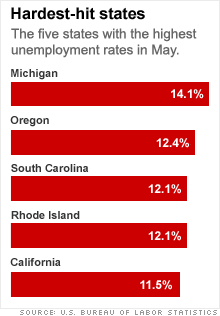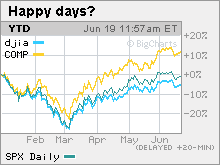Is the recession over?
Some experts point to stabilization in the housing and job markets as signs the recession has ended. Others continue to see weeds - not green shoots.



 |
| After a brutal start to the year, stocks have surged since March. Some think it's a typical bear market rally while others claim investors are correctly anticipating an economic recovery. |
NEW YORK (CNNMoney.com) -- The recession began in December 2007. Did it end sometime this spring?
It's a provocative question that's tough to answer. It's tempting to say the recession is over when that seems to be what the stock market is telling us.
But Wall Street hardly has a perfect track record: There were numerous bear market rallies during the Great Depression, for example.
Stocks also enjoyed a nice run last spring after Bear Stearns almost imploded, even though the collapses of Fannie Mae (FNM, Fortune 500), Freddie Mac (FRE, Fortune 500), Lehman Brothers and AIG (AIG, Fortune 500) were still yet to come.
"With all due respect to Mr. Market, it is highly fallible as a forward looking barometer," said David Rosenberg, chief economist & strategist at Gluskin Sheff + Associates, a Toronto-based wealth management firm.
The jump in stocks also poses another chicken-versus-egg question: Is the market rallying because people think the recession is over or do people think the recession is over because the stock market is rallying?
If it's the latter, that's not necessarily great news. Rosenberg said he thinks it's "beyond bizarre" to say the recession is over. The economy may have pulled out of the free fall that took place from September through February, he said, but that shouldn't be confused with a bottom.
"We're still in a recession. Are we past the worst point of it? 100% yes. But is the downturn over? It's far too premature to make that assessment," he said.
Talkback: Is the recession over? If so, why do you think that's the case? If not, when will it finally end? Leave your comments at the bottom of this story.
Jim Keegan, chief investment officer of Seix Investment Advisors, which manages the RidgeWorth Intermediate Bond fund, agreed that the recession may not be over yet. He said that even though the pace of decline may be slowing, it's still a decline.
"The green shoots everybody's talking about look more like dandelions. 'Less bad' is not good," he said.
But Liz Ann Sonders, chief investment strategist with Charles Schwab & Co., believes that the recession ended sometime in the past two months and that the market is doing what is usually does, heading higher before it's common knowledge that the economy is recovering.
Sonders noted that the Leading Indicators Index, a report that looks at consumer goods orders, stock prices, building permits and seven other key economic data points, rose sharply in May for the second consecutive month.
The report, released Thursday, showed a 1.2% increase last month, following a 1.1% rise in April. Sonders thinks this is significant because it's the largest two-month consecutive jump since November and December 2001 -- the first two months that followed the end of the 2001 recession.
Dan North, chief U.S. economist with Euler Hermes, a leading credit insurer, said he's encouraged by signs of life in the housing market.
"You have record affordability with home prices and even though people are wringing their hands about mortgage rates rising lately, they are still historically cheap," he said.
North added that he thinks the decision by homebuilder Pulte Homes (PHM, Fortune 500) to buy rival Centex (CTX, Fortune 500) in April could be a sign of a bottom in housing since it could represent renewed confidence.
Kathy Lien, director of currency research at GFT, a foreign exchange and futures brokerage firm, also thinks that the recession has just about run its course.
She said that declines in the average number of jobless claims from their peak a few months ago is an encouraging sign, as are reports of improving home sales and stabilization in the manufacturing sector.
"There are signals indicating that the areas of the market that suffered the most in the recession are turning around, such as housing, manufacturing and the labor markets," she said. "All this, in combination, sends a strong message to us that the worst is behind us."
Still, Rosenberg counters that the labor and housing markets remain weak and should stay so for the foreseeable future.
He notes that jobless claims may only be declining because of the surge in the number of people who have exhausted their unemployment benefits. Plus, the unemployment rate has continued to rise sharply in recent months.
And even though many economists point to unemployment as a so-called lagging indicator -- i.e. it probably won't peak until after the recession is over -- Rosenberg disagrees. In many previous recessions, especially those led by downturns in business spending, it was true that the broad economy could recover before the job market.
But Rosenberg said this is a different kind of recession since it was caused by a credit bubble. So he believes that unemployment is no longer a lagging indicator, but one that is coincidental and perhaps even leading.
"There is a perfect link between unemployment and consumer delinquencies," he said.
He added that home sales may be improving, but prices continue to fall in many markets. He is also worried that rising unemployment could cause many borrowers who have so-called alt-A loans that are about to reset to default on their mortgages.
"We've got another leg down in housing and foreclosures. We need stabilization in home prices and the unemployment rate and we might be a year away from that," he said.
Of course, the debate about whether the recession is or isn't over should not overshadow the fact that the whole notion of a recession is largely a case of semantics.
Contrary to popular belief, a recession is not defined as two consecutive quarters of declines in the nation's gross domestic product; a group known as the The National Bureau of Research makes the official call on recessions by looking at various economic trends beyond GDP.
And the NBER is notoriously slow in deciding when recessions begin and end. It didn't declare until July 2003 that the 2001 recession ended in November of that year. The NBER also waited until last December to announce that the current recession started in December 2007.
Sot his might be a more important question to ask: When will the economic pain actually end?
Sonders conceded that even though she thinks the recession is over, she's not a blind-eyed optimist. "I'm not telling clients to do anything differently. It doesn't feel great now. I understand that."
Lien also said that no matter what happens on Wall Street, it's not going to look good on Main Street for a while longer.
"There's a big difference between the recession being over and increased growth. It's probably going to be a slow, painful recovery," she said.
With that in mind, it may not really matter all that much when the NBER says the recession is over.
"The end of the recession won't be like a hammer hitting you in the head," North said. "There are signs that the economy is turning the corner but it won't feel good for months and months yet. If you don't have a job, you don't care if GDP is going up. You care that you don't have a job."
Talkback:What do you think? Is the recession over? If so, why do you think that's the case? If not, when will it finally end? ![]()

